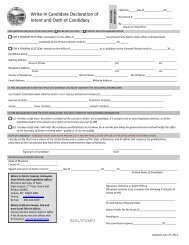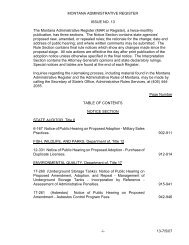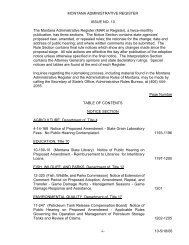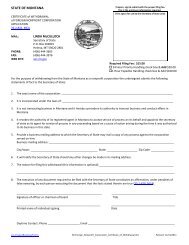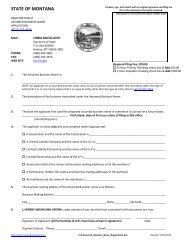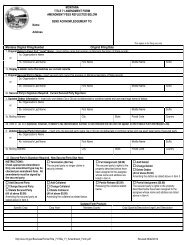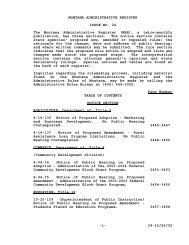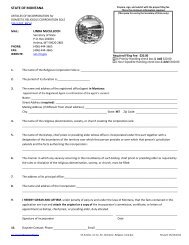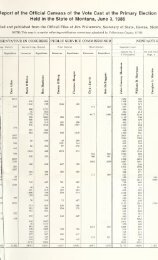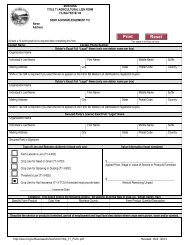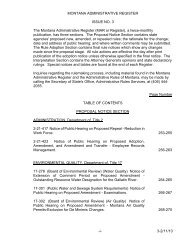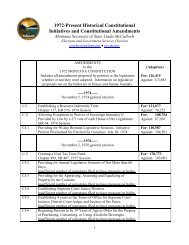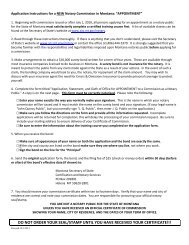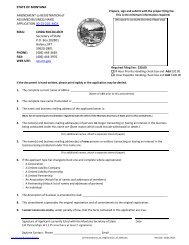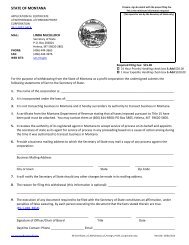Notary Handbook - the Montana Secretary of State Website
Notary Handbook - the Montana Secretary of State Website
Notary Handbook - the Montana Secretary of State Website
You also want an ePaper? Increase the reach of your titles
YUMPU automatically turns print PDFs into web optimized ePapers that Google loves.
1-5-416. Powers and duties. (1) A notary public shall: (a) subject to subsection (2), take <strong>the</strong> acknowledgment or pro<strong>of</strong> <strong>of</strong> any power <strong>of</strong><br />
attorney, mortgage, deed, grant, transfer, or o<strong>the</strong>r instrument executed by any person and give a certificate <strong>of</strong> <strong>the</strong> pro<strong>of</strong> or acknowledgment,<br />
endorsed on or attached to <strong>the</strong> instrument; (b) take depositions and affidavits, if <strong>the</strong> notary is knowledgeable <strong>of</strong> <strong>the</strong> applicable legal<br />
requirements, and administer oaths and affirmations in all matters incident to <strong>the</strong> duties <strong>of</strong> <strong>the</strong> notary public's <strong>of</strong>fice or to be used before any<br />
court, judge, <strong>of</strong>ficer, or board in this state; (c) whenever requested and upon payment <strong>of</strong> <strong>the</strong> required fees, make and give a certified copy <strong>of</strong><br />
any record kept or that originated in <strong>the</strong> notary public's place <strong>of</strong> employment; (d) provide and keep an <strong>of</strong>ficial ink stamp and seal prescribed<br />
by <strong>the</strong> secretary <strong>of</strong> state; (e) au<strong>the</strong>nticate with <strong>the</strong> notary public's <strong>of</strong>ficial seal, and <strong>the</strong> notary's original signature, which must be in blue or<br />
black ink, as it appears on <strong>the</strong> notary's certificate <strong>of</strong> commission, all <strong>of</strong>ficial acts. Whenever <strong>the</strong> notary public signs <strong>of</strong>ficially as a notary public,<br />
<strong>the</strong> notary public shall add to <strong>the</strong> signature <strong>the</strong> words "<strong>Notary</strong> Public for <strong>the</strong> <strong>State</strong> <strong>of</strong> <strong>Montana</strong>, residing at.... (stating <strong>the</strong> name <strong>of</strong> <strong>the</strong> town or<br />
city <strong>of</strong> <strong>the</strong> notary public's post <strong>of</strong>fice)" and shall endorse upon <strong>the</strong> instrument <strong>the</strong> date, showing <strong>the</strong> month, day, and four-digit year, <strong>of</strong> <strong>the</strong><br />
expiration <strong>of</strong> <strong>the</strong> notary public's commission. (f) on every document on which <strong>the</strong> notary's seal <strong>of</strong> <strong>of</strong>fice is used, type, stamp, or legibly print<br />
<strong>the</strong> notary's name, as shown on <strong>the</strong> notary's certificate <strong>of</strong> commission, after or below <strong>the</strong> original signature <strong>of</strong> <strong>the</strong> notary; (g) keep and<br />
maintain an <strong>of</strong>ficial notary journal recording <strong>the</strong> details <strong>of</strong> each notarial act performed, including <strong>the</strong> date, <strong>the</strong> type <strong>of</strong> notarial act, <strong>the</strong> type <strong>of</strong><br />
document, <strong>the</strong> date <strong>of</strong> <strong>the</strong> document, <strong>the</strong> name, address, and signature <strong>of</strong> <strong>the</strong> individual for whom <strong>the</strong> notarization was performed, <strong>the</strong> type<br />
<strong>of</strong> identification used, and any o<strong>the</strong>r information prescribed by <strong>the</strong> secretary <strong>of</strong> state. (2) A notary public may not: (a) notarize <strong>the</strong> notary's<br />
own signature; (b) notarize a document in which <strong>the</strong> notary is individually named or has an interest from which <strong>the</strong> notary will directly<br />
benefit by a transaction involving <strong>the</strong> document; or (c) certify a document issued by a public entity, such as a birth, death, or marriage<br />
certificate, unless <strong>the</strong> notary is employed by <strong>the</strong> entity issuing or holding <strong>the</strong> original version <strong>of</strong> that document.<br />
1-5-417. Authority <strong>of</strong> notaries who are stockholders, <strong>of</strong>ficers, or employees <strong>of</strong> banks or o<strong>the</strong>r corporations. (1) Except as provided in this<br />
section, a notary public who is a stockholder, director, <strong>of</strong>ficer, or employee <strong>of</strong> a bank or o<strong>the</strong>r corporation may: (a) take <strong>the</strong> acknowledgment<br />
<strong>of</strong> a party to a written instrument executed to or by that bank or corporation; (b) administer an oath to any o<strong>the</strong>r stockholder, director,<br />
<strong>of</strong>ficer, employee, or agent <strong>of</strong> that bank or corporation; or (c) protest for nonacceptance or nonpayment bills <strong>of</strong> exchange, drafts, checks,<br />
notes, and o<strong>the</strong>r negotiable instruments that may be owned or held for collection by that bank or o<strong>the</strong>r corporation. (2) A notary public who<br />
is a stockholder, director, <strong>of</strong>ficer, or employee <strong>of</strong> a bank or o<strong>the</strong>r corporation and is individually named in an instrument or signs an<br />
instrument as a representative <strong>of</strong> <strong>the</strong> bank or o<strong>the</strong>r corporation may not: (a) take <strong>the</strong> acknowledgment <strong>of</strong> that instrument by or to that bank<br />
or o<strong>the</strong>r corporation; or (b) protest a negotiable instrument owned or held for collection by that bank or o<strong>the</strong>r corporation. (3) A notary<br />
public who violates this section is guilty <strong>of</strong> a misdemeanor and upon conviction must be punished as provided by law.<br />
1-5-418. Maximum fees <strong>of</strong> notaries. Maximum fees <strong>of</strong> notaries public are as follows: (1) for drawing an affidavit, deposition, or o<strong>the</strong>r paper<br />
for which a maximum fee is not o<strong>the</strong>rwise specified, $3.50 a page; (2) for taking an acknowledgment or pro<strong>of</strong> <strong>of</strong> a deed or o<strong>the</strong>r instrument,<br />
including <strong>the</strong> seal and <strong>the</strong> writing <strong>of</strong> <strong>the</strong> certificate, for <strong>the</strong> first signature, $5; (3) for each additional signature <strong>of</strong> <strong>the</strong> same person as referred<br />
to in subsection (1), $1; (4) for administering an oath or affirmation, $5; (5) for certifying an affidavit, with or without seal, including oath, $5;<br />
and (6) for mileage or o<strong>the</strong>r charge to travel to or from or to and from <strong>the</strong> place <strong>of</strong> <strong>the</strong> notarial act, <strong>the</strong> amount provided by law for state<br />
employees when using <strong>the</strong> same mode <strong>of</strong> travel and traveling on state business.<br />
1-5-419. Transfer <strong>of</strong> records upon termination <strong>of</strong> <strong>of</strong>fice. (1) A notary public, upon resignation or removal from <strong>of</strong>fice or at <strong>the</strong> expiration <strong>of</strong><br />
his term, if <strong>the</strong> notary public is not reappointed, or, in case <strong>of</strong> <strong>the</strong> notary public’s death, <strong>the</strong> notary public’s legal representative shall: (a)<br />
transfer in a timely manner all <strong>the</strong> journals kept by <strong>the</strong> notary public to <strong>the</strong> <strong>of</strong>fice <strong>of</strong> <strong>the</strong> secretary <strong>of</strong> state; and (b) destroy <strong>the</strong> notary’s<br />
<strong>of</strong>ficial stamp and seal. (2) A knowing failure to take <strong>the</strong> actions prescribed in subsection (1) makes <strong>the</strong> <strong>of</strong>fending person liable for damages<br />
to any person injured by <strong>the</strong> failure.<br />
1-5-420. Powers and duties <strong>of</strong> secretary <strong>of</strong> state when records deposited. It is <strong>the</strong> duty <strong>of</strong> <strong>the</strong> secretary <strong>of</strong> state to receive and safely keep<br />
all records and papers <strong>of</strong> <strong>the</strong> notary in <strong>the</strong> case described in 1-5-419 and to give attested copies <strong>of</strong> <strong>the</strong>m under a seal.<br />
Part 6. Notarial Acts<br />
1-5-601. Short title. This part may be cited as <strong>the</strong> "Uniform Law on Notarial Acts".<br />
1-5-602. Definitions. As used in this part, <strong>the</strong> following definitions apply:<br />
(1) "Acknowledgment" means a declaration by a person that <strong>the</strong> person has executed an instrument for <strong>the</strong> purposes stated in <strong>the</strong><br />
instrument and, if <strong>the</strong> instrument is executed in a representative capacity, that <strong>the</strong> person signed <strong>the</strong> instrument with proper authority and<br />
executed it as <strong>the</strong> act <strong>of</strong> <strong>the</strong> person or entity represented and identified in <strong>the</strong> instrument. (2) "In a representative capacity" means: (a) for<br />
and on behalf <strong>of</strong> a corporation, partnership, trust, or o<strong>the</strong>r entity as an authorized <strong>of</strong>ficer, agent, partner, trustee, or o<strong>the</strong>r representative;<br />
(b) as a public <strong>of</strong>ficer, personal representative, guardian, or o<strong>the</strong>r representative in <strong>the</strong> capacity recited in <strong>the</strong> instrument; (c) as an attorney<br />
in fact for a principal; or (d) in any o<strong>the</strong>r capacity as an authorized representative <strong>of</strong> ano<strong>the</strong>r. (3) "Notarial act" means any act that a notary<br />
public <strong>of</strong> this state is authorized to perform and includes taking an acknowledgment, administering an oath or affirmation, taking a<br />
verification upon oath or affirmation, witnessing or attesting a signature, certifying or attesting a copy, and noting a protest <strong>of</strong> a negotiable<br />
instrument. (4) "Notarial <strong>of</strong>ficer" means a notary public or o<strong>the</strong>r <strong>of</strong>ficer authorized to perform notarial acts. (5) "Verification upon oath or<br />
affirmation" means a declaration that a statement is true made by a person upon oath or affirmation.<br />
28



